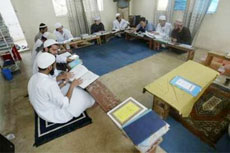|
Pakistani Madrasahs May Legally Defy Expulsion
 |
|
So
far no forced expulsions took place.
|
By
Umer Farooq, IOL Correspondent
ISLAMABAD,
August 11, 2005 (IslamOnline.net) – The leaders of Madrasahs in
Pakistan are in the process of holding dialogues with the government
over the decision to expel foreigners from the religious seminaries,
but they are not ruling out the option of resorting to the apex court
for a legal reversal of the decision.
The
leading Alliance of Madrasahs Organization,
Itehada-Tenzeem-ul-Madarashs (Alliance of Organization of Madrasahs)
has considered the option of going to the Supreme Court against the
decision. They, however, decided to put off the legal option at this
stage.
“We
have considered the option (going to the Supreme Court), but we think
that it is not appropriate at this stage to move the court on these
issues as we are still engaged in (a) dialogue process with the
government,” Chairman of Itehada-Tenzeem-ul-Madarashs Mufti
Muneeb-ur-Rehman told IOL Thursday, August 11.
Pakistani
President Pervez Musharraf announced the decision to expel foreign
students from the Madrasahs after allegations of possible links
between London bombers and Pakistan madrasahs surfaced.
The
government has not indicated any deadline for the implementation of
the decision, and no case of forced expulsion of students has been
reported so far.
There
have also been meetings between government officials and Madrasahs
leaders on the issue in the course of the past few days.
Muneeb-ur-Rehman
said that the Madrasahs' officials hope there would be no forced
expulsion of students till the completion of the current Academic
year.
“We
hope there will be no forced expulsion till September when final exams
will be taking place. In our dialogue with the government, we have got
some positive indications."
Stricter
Stand
 |
|
Madrasahs
officials said they were still talking to the government to
reverse the decision. (Reuters)
|
But
the stance of Muneeb-ur-Rehman was not the only one surfacing. A
number of religious leaders has expressed their intention to resort to
legal action once the government starts to take steps to implement its
decision.
North-West
Frontier Province (NWFP) provincial Law Minister, Zafar Azam, on his
part, has termed the expulsion decision unconstitutional and said that
his government may soon go to the court to contest it.
According
to an official statement, Law Minister Azam expressed his provincial
government's intention (of going to court) in a meeting with a US
diplomat who visited Azam in his office in Peshawar, the provincial
capital.
“We
may go to the court against the Federal government decision,” said
Zafar Azam, according to the statement.
Some
of the leaders of the alliance of religious-political parties have
also expressed the intention of going to the court against the
decision.
Within
the same context, member of parliament and political leader Hafiz
Hussein Ahmed, who runs a Madrasah of his own, vowed to go to the
court against the decision, branding it "in violation of the
constitution".
Some
of the leaders have said that the expulsion would amount to forcing
madrasahs to stop imparting religious education to their students.
Distinction
It
is important here to note that the distinction between those
advocating swift legal recourse and those advocating dialogue is
primarily that of political orientation. The declaration of going to
the court came from those engaged in active politics, says IOL
Correspondent.
“We
are not political people we are religious teachers imparting religious
education to our students,” Mutfi Muneeb-ur-Rehman told IOL.
He
added that those who have taken controversial issues to the Supreme
Court in the past have mostly been disappointed, citing the issue of
Legal Framework Order (LFO) when the court endorsed the government.
But
Muneeb-ur-Rehman made it clear he was not completely ruling out the
possibility of going to the Court on the issue.
“Going
to the court will be the last resort.”
Both
Musharraf and his prime minister have repeatedly said that the
expulsion decision is final and there would be no reversal.
However,
there are voices within the ruling party advocating a more lenient
view on the issue.
|